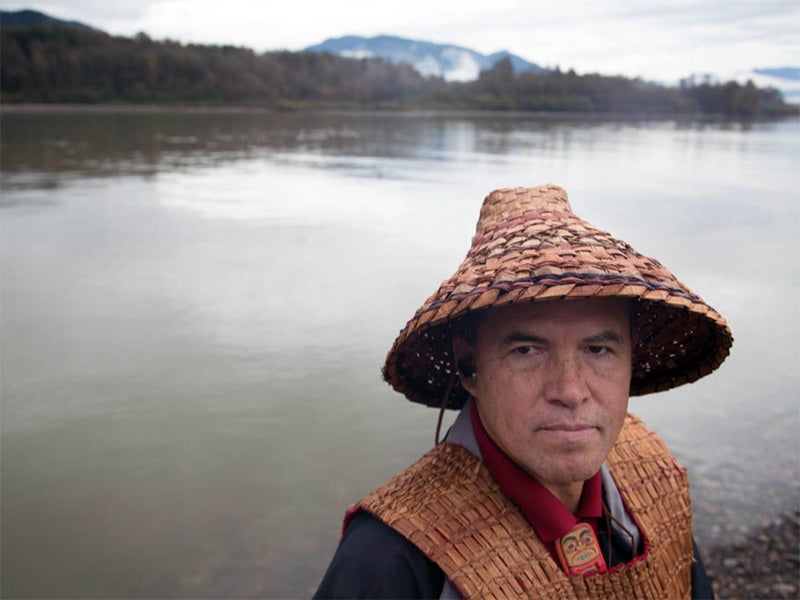Northwest Tribes Continue to Oppose Massive Pipeline Expansion in Canada
U.S. Tribes dismayed at Trudeau’s approval of the TransMountain pipeline
Contact
Opposition to the TransMountain pipeline from Coast Salish Tribes on both sides of the U.S.-Canada border continued today in the wake of Canadian Prime Minister Justin Trudeau’s announced approval of the Kinder Morgan project.
The proposed tar sands pipeline expansion is one of several projects that would dramatically increase the passage of tankers and bulk carriers through the Salish Sea on both sides of the U.S.-Canada border.
“The Tulalip Tribes are extremely disappointed with Prime Minister Trudeau’s approval of the TransMountain Pipeline, and we face the very real threat of an oil spill that puts the Salish Sea at risk,” said Mel Sheldon, Tulalip Tribes Chairman. “Prime Minister Trudeau has made a decision that carries with it potentially catastrophic consequences for our Treaty-reserved rights to fish and harvest in our usual and accustomed territories, one that directly affects United States waters, and threatens the environment on which our treaty rights depend.”
Over three years ago, an alliance of Northwest U.S. Tribes—the Swinomish Indian Tribal Community, Tulalip Tribes, Suquamish Tribe, and Lummi Nation, represented by Earthjustice—intervened in Canadian permit proceedings over the new tar sands pipeline, joining scores of Canadian First Nations and conservationists, the cities of Vancouver and Burnaby, and the Province of British Columbia in opposition to the pipeline. The U.S. Tribes’ position before Canada’s National Energy Board (NEB) represented a critical call to safeguard the Salish Sea from increased oil tanker traffic and greater risk of oil spills.
“The First People who have called this place home since time immemorial, the Coast Salish, have felt the impacts of a pollution-based economy for the last 150 years,” said Brian Cladoosby, Swinomish Tribal Chairman. “It is time for us to turn the tide and make decisions that reflect the deteriorated state of the Salish Sea’s health and resources. Canada’s decision on TransMountain goes in the wrong direction.”
Despite undisputed evidence presented by Tribal nations from the U.S. and Canada about the devastation an oil spill would cause to their cultures and livelihoods, the NEB found the level of risk of an oil spill from the terminal or an oil tanker “acceptable.” The NEB also found that the project would cause significant harm to orca whales and that increased tanker traffic would cause significant greenhouse gas emissions, but viewed those harms as outweighed by economic interests in the pipeline. The Prime Minister’s decision yesterday accepted those findings.
“The Canadian government absolutely ignored U.S. Tribal rights and treaties to reach the Kinder Morgan decision,” said Kristen Boyles, an attorney with Earthjustice representing the US Tribes in Canadian regulatory proceedings. “Harm from an oil spill and increased oil tanker traffic won’t stop at the Canadian border.”
Chris Jordan-Bloch / Earthjustice
Dana Wilson and Jim Kelly, members of the Lummi Nation, pull a chum salmon from the Salish Sea. “What are we going to have left for our future generations if we don’t start managing and watching where we’re at and the direction we’re going in?” asks Wilson. See more videos.
The TransMountain Pipeline Project calls for tripling the amount of oil shipped from tar sands fields in Alberta to approximately 890,000 barrels per day to the British Columbia coast. The pipeline would cause an almost seven-fold increase in oil tankers moving through the shared waters of the Salish Sea, paving way for an increase in groundings, accidents, and oil spills.
The proposed tar sands pipeline expansion is one of several projects that could dramatically increase the passage of tankers and bulk carriers through the Salish Sea on both sides of the U.S.-Canada border.
“The Lummi Nation has long believed that the TransMountain Pipeline should not go forward,” said Jewell James of the Lummi Nation. “No actions should be authorized without in-depth consultation with the Nations and Bands impacted by the proposed project.”
“The Suquamish Tribe is disappointed with approval of the TransMountain pipeline project, especially in light of the significant impacts the project will have on treaty fishing activities and the high probability of a catastrophic oil spill that would jeopardize our ancient way of life,” said Leonard Forsman, Suquamish Tribal Chairman. “We will continue to oppose this and other projects that threaten our ancestral waters in the Salish Sea.”
Resources:

Additional Resources
About Earthjustice
Earthjustice is the premier nonprofit environmental law organization. We wield the power of law and the strength of partnership to protect people's health, to preserve magnificent places and wildlife, to advance clean energy, and to combat climate change. We are here because the earth needs a good lawyer.